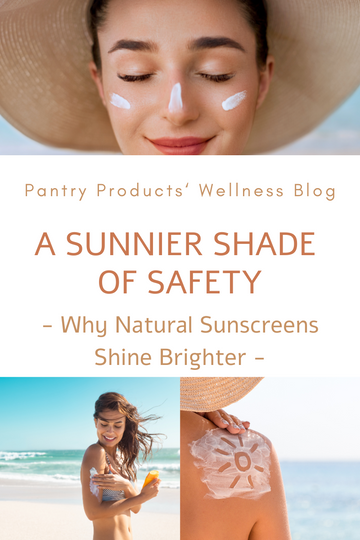A Sunnier Shade of Safety: Why Natural Sunscreens Shine Brighter
by Michelle Czarka on Feb 08, 2024

If you still using conventional, chemical sunscreens – the kind found at most drugstores or mass merchants – now’s a good time to make the switch to a natural, non-toxic sunscreen brand.

Why? you ask.
5 Reasons Why Conventional Sunscreens Can Be Toxic
1. **Chemical Ingredients**: Many conventional sunscreens contain chemicals such as oxybenzone, avobenzone, octisalate, octocrylene, homosalate, and octinoxate. These chemicals have been linked to various health concerns, including hormone disruption, allergic reactions, and skin irritation. Oxybenzone, in particular, has been associated with coral reef damage.
2. **Nanoparticles**: Some sunscreens contain nanoparticles of titanium dioxide or zinc oxide, which are used to provide transparent coverage. However, these nanoparticles can penetrate the skin and potentially cause cellular damage, inflammation, and even DNA mutation.
3. **Endocrine Disruption**: Certain chemicals found in sunscreens, such as oxybenzone, have been shown to mimic hormones in the body, disrupting the endocrine system. This disruption can lead to reproductive issues, developmental disorders, and other hormonal imbalances.
4. **Skin Irritation and Sensitization**: Chemical ingredients in sunscreens can cause skin irritation and sensitization, especially in individuals with sensitive skin or allergies. Repeated exposure to these chemicals can exacerbate existing skin conditions and lead to long-term damage.
5. **Environmental Impact**: Chemicals in some sunscreens, such as oxybenzone and octinoxate, have been shown to be harmful to marine life and coral reefs. These chemicals can leach into the water when individuals swim in oceans or lakes, contributing to coral bleaching and disrupting aquatic ecosystems.
It's important to note that not all store-bought sunscreens contain toxic ingredients, and there are many safer and more environmentally friendly options available. Reading ingredient labels and choosing sunscreens that use mineral-based ingredients like zinc oxide or titanium dioxide can help minimize exposure to potentially harmful chemicals.
Additionally, opting for sunscreens labeled as "reef-safe" can reduce environmental impact when swimming in marine environments.

How to Choose a Safe Sunscreen
Using a natural sunscreen can be considered better for several reasons, particularly for those concerned about potential health risks associated with conventional chemical sunscreens and their environmental impact. Here's why using a natural sunscreen may be beneficial:
1. **Minimized Chemical Exposure**: Natural sunscreens typically rely on mineral-based UV filters such as zinc oxide and titanium dioxide, which sit on the surface of the skin and physically block or scatter UV radiation. These mineral ingredients are considered safer than some chemical UV filters found in conventional sunscreens, reducing the risk of skin irritation, allergic reactions, and hormone disruption.
2. **Gentler on Sensitive Skin**: Mineral sunscreens are less likely to cause skin irritation or allergic reactions compared to chemical sunscreens, making them suitable for individuals with sensitive skin or conditions such as eczema or rosacea.
3. **Environmental Friendliness**: Natural sunscreens typically contain biodegradable ingredients that are less harmful to marine ecosystems and coral reefs. Mineral UV filters like zinc oxide and titanium dioxide are considered reef-safe and do not contribute to coral bleaching or other environmental damage caused by chemical UV filters like oxybenzone and octinoxate.
4. **Broad-Spectrum Protection**: Many natural sunscreens offer broad-spectrum protection against both UVA and UVB radiation, similar to conventional sunscreens. They can effectively protect the skin from sunburn, premature aging, and skin cancer without the use of potentially harmful chemicals.
5. **Safer for Children and Pregnant Women**: Natural sunscreens are often recommended for children and pregnant women due to their gentler formulation and minimal use of potentially harmful chemicals. They provide effective sun protection without exposing sensitive populations to unnecessary risks.
6. **Less Risk of Phototoxic Reactions**: Natural sunscreens are less likely to undergo phototoxic reactions when exposed to sunlight, as they rely on physical blockers rather than chemical filters that can produce harmful free radicals upon UV exposure.
7. **Transparency in Ingredients**: Natural sunscreen formulations often have simpler ingredient lists, making it easier for consumers to understand what they're putting on their skin. This transparency allows individuals to make informed choices and avoid potentially harmful chemicals.
It's important to note that while natural sunscreens offer several benefits, they may also have limitations, such as potential whitening or greasiness due to the presence of mineral particles. At Pantry Products, we have improved our formulation to minimize these issues while still providing effective sun protection. And we’re low-waste and reef-safe!
